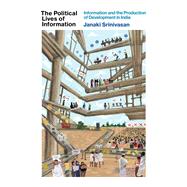The Political Lives of Information Information and the Production of Development in India
, by Srinivasan, Janaki- ISBN: 9780262544047 | 0262544040
- Cover: Paperback
- Copyright: 10/4/2022
How the definition, production, and leveraging of information are shaped by caste, class, and gender, and the implications for development.
Information, says Janaki Srinivasan, has fundamentally reshaped development discourse and practice. In this study, she examines the history of the idea of “information” and its political implications for poverty alleviation. She presents three cases in India—the circulation of price information in a fish market in Kerala, government information in information kiosks operated by a nonprofit in Puducherry, and a political campaign demanding a right to information in Rajasthan—to explore three uses of information to support goals of social change. Countering claims that information is naturally and universally empowering, Srinivasan shows how the definition, production, and leveraging of information are shaped by caste, class, and gender.
Srinivasan draws on archival and ethnographic research to challenge the idea of information as objective and factual. Using the concept of an “information order,” she examines how the meaning and value of information reflect the social relations in which it is embedded. She asks why casting information as a tool of development and solution to poverty appeals to actors across the political spectrum. She also shows how the power to label some things information and others not is at least as significant as the capacity to subsequently produce, access, and leverage information. The more faith we place in what information can do, she cautions, the less attention we pay to its political lives and to the role of specific social structures, individual agency, and material form in the defining, production, and use of that information.
Information, says Janaki Srinivasan, has fundamentally reshaped development discourse and practice. In this study, she examines the history of the idea of “information” and its political implications for poverty alleviation. She presents three cases in India—the circulation of price information in a fish market in Kerala, government information in information kiosks operated by a nonprofit in Puducherry, and a political campaign demanding a right to information in Rajasthan—to explore three uses of information to support goals of social change. Countering claims that information is naturally and universally empowering, Srinivasan shows how the definition, production, and leveraging of information are shaped by caste, class, and gender.
Srinivasan draws on archival and ethnographic research to challenge the idea of information as objective and factual. Using the concept of an “information order,” she examines how the meaning and value of information reflect the social relations in which it is embedded. She asks why casting information as a tool of development and solution to poverty appeals to actors across the political spectrum. She also shows how the power to label some things information and others not is at least as significant as the capacity to subsequently produce, access, and leverage information. The more faith we place in what information can do, she cautions, the less attention we pay to its political lives and to the role of specific social structures, individual agency, and material form in the defining, production, and use of that information.







